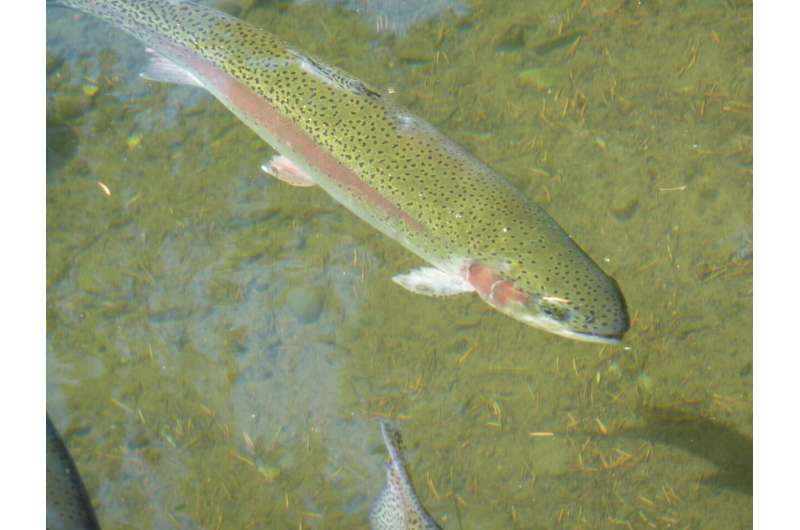This article has been reviewed according to Science X's editorial process and policies. Editors have highlighted the following attributes while ensuring the content's credibility:
fact-checked
trusted source
proofread
Scientists determine how to properly feed rainbow trout

Scientists from the RUDN University and colleagues from Iran have determined the optimal dosage of a popular dietary supplement for rainbow trout. Exceeding it not only negates a positive effect, but can cause harm to the health of the fish. Results of the study have been published in Aquaculture.
Propionic acid salts—propionates—are used as food additives for humans and animals. For example, propionate improves the growth of fish. The dosage varies for each type of fish and is selected experimentally. For rainbow trout, the optimal dosage of propionate was not yet known. The researchers Iran have filled this gap.
"Dietary supplements with propionate improve growth indicators, immune parameters, antioxidant activity, and the work of digestive enzymes of fish. However, an excessive amount of propionate harms their health. Rainbow trout is one of the most important types of aquaculture. This fish is loved all over the world," said Morteza Yousefi, associate professor of the RUDN Department of Veterinary Medicine.
To test the effect of a dietary supplement, veterinarians added 1 to 5 grams of sodium propionate per 1 kg of regular rainbow trout feed for 70 days. The fish were divided into four groups. One group did not receive added propionate. After the end of the experiment, the scientists evaluated fish growth rates, lipid deposits in the liver, the activity of digestive enzymes in the intestine, microflora, and the antioxidant activity of the fish body.
The results showed a statistically significant difference in all measured parameters in fish treated with different amounts of propionate. The growth and assimilation of feed improved in those fish that received 1 or 2.5 grams of propionate. In those who received 5 grams of the supplement, these indicators, on the contrary, fell below the control group. The hepatosomatic index, which shows the intensity of fat accumulation in the liver, decreased in the first two groups and increased in the last. Additionally, the number of dangerous bacteria in the intestinal microflora increased in fish from the latter group.
"A dosage of 2.5 grams of sodium propionate is suitable for rainbow trout, but higher doses delay growth, lead to the accumulation of lipids in the liver, cause oxidative stress in the intestine, inflammation and dysbiosis," said Yousefi.
More information: Morteza Yousefi et al, Dietary propionate administration improves growth performance, hepatic lipid deposition, and intestinal activity of digestive enzymes, inflammation, bacterial population, and antioxidant capacity in rainbow trout, Oncorhynchus mykiss, Aquaculture (2023). DOI: 10.1016/j.aquaculture.2023.740099
Provided by RUDN University

















